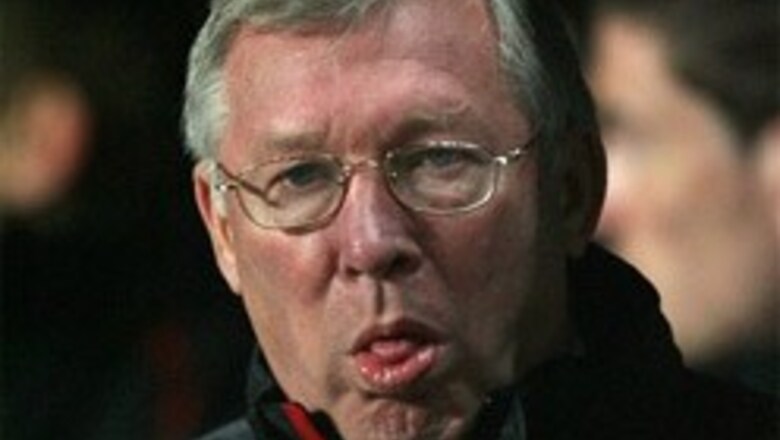
views
Manchester: Knighted for his services to football, Alex Ferguson's journey to the top of his chosen profession started in humble surroundings.
Born and raised in a working-class area of Glasgow, Ferguson was never handed anything on a plate.
But encouraged by a supportive family and strong work ethic, he followed in the footsteps of great Scottish football men like Jock Stein, Bill Shankly and United's exalted boss Sir Matt Busby, whose successes Ferguson has surpassed at Old Trafford.
Fiercely proud of his roots around the now departed shipyards and factories of Govan, where he worked as a toolmaker while learning his trade as a footballer, Ferguson believes his future success was shaped by his formative years.
In his autobiography Managing My Life, he writes: "I have no doubt it is true and I am sure, too, that any success I have had in handling men, and especially in creating a culture of loyalty and commitment in teams I have managed, owes much to my upbringing among the working men of Clydeside."
Ferguson, born on New Year's Eve, 1941, was never short of footballing opportunities or the hunger to take them and rising through school, club and amateur football he graduated from Scotland youth international to a professional player.
A goalscoring centre-forward, his playing career took him to Queens Park, St Johnstone, Dunfermline, Rangers, Falkirk and Ayr United.
Boyhood Club
His treatment towards the end of his time at Rangers and his departure from Ibrox Park badly hurt him and despite subsequent offers he never returned to manage the club he supported.
However, management and coaching always held an appeal and by 1966, eight years before he finished playing, he had obtained his full coaching qualification.
That was first used to the full when he was appointed manager of East Stirlingshire at the age of 32 and such was his impact that within four months he had taken charge of Scottish first division side St Mirren.
A thriving youth policy and scouting network were to be bedrocks of Ferguson's approach to management and as well as being an innovative coach at St Mirren he also played his part in actively marketing the club.
It is perhaps ironic that he helped the club launch its own newspaper, given that in later years, and despite having some close friends and contacts in journalism, his approach to the media often bordered on contempt.
Success on the field also swelled crowds at St Mirren and in 1978 Ferguson moved upwards again to begin a remarkable eight-year spell as manager of Aberdeen.
Breaking the Old Firm stranglehold of Rangers and Celtic was a phenomenal achievement for a provincial club as Aberdeen collected three league titles, four Scottish Cups and one Scottish League Cup in his period in charge.
PAGE_BREAK
"My aim in management has always been to lay foundations that will make a club successful for years, or even decades. The true indication of worth is to be in contention for the championship season after season," Ferguson said in his autobiography.
Major Highlight
Nevertheless, winning the European Cup Winners' Cup in 1983 was a major highlight of his time in charge at Pittodrie.
After achieving everything he could in Scotland, Ferguson opted not to become national coach on a permanent basis after leading Scotland as caretaker at the 1986 World Cup following the death of Jock Stein the previous year.
Instead, he took on the ultimate challenge as manager of Manchester United following the departure of Ron Atkinson.
His first day was November 6, 1986. His first match in charge was a 2-0 defeat at Oxford United two days later. Manchester United were 20th in the 22-team first division.
A lot has altered in the 20 years since then, including Ferguson changing his mind about retiring in 2002. He is still in charge at United thanks to a record haul of 17 major trophies, including one European Cup, eight premier league titles, five FA Cups and two League Cups.
In 1999, Ferguson led United to an unprecedented treble of Premier League, FA Cup and Champions League victories.
"Only through success can a manager gain the control that is indispensable to him," said Ferguson in Managing My Life.
It was not always like that as he initially struggled to end United's barren years and had to break a drinking culture that had engulfed Old Trafford, where the league championship had not been won since Busby took it there in 1967.
However, he has never been afraid of making brave decisions, whether selling popular players or promoting younger ones.
The emergence of Ryan Giggs, David Beckham, Paul Scholes, Nicky Butt and brothers Gary and Phil Neville from United's youth team helped United dominate English football in the 1990s.
Ferguson has regrets about explosions of temper and loss of control and Beckham's departure from Old Trafford was soured by a breakdown in their relationship and the infamous flying boot which Ferguson kicked on to Beckham's head in a post-match rage.
According to Beckham at the time - and more recently - that was an accident and recently the former England captain has spoken only about fond memories of United and Ferguson.
Loyalty is the trait most favoured by Ferguson and as he approaches his 20th anniversary at Old Trafford, with United again challenging for domestic and European honours, his cannot be called into question.




















Comments
0 comment